Department Profile
The Department of Botany has been functioning actively since 1968 and grew into Post Graduate Department in the year 2010-2011. It has a well-equipped Botany Lab with sophisticated equipment. The students have secured 145 University ranks including 13 First ranks and the Department has been consistently maintaining a high rate of academic success. Four conference/seminar/workshop at National/ state level have been organized with the help of UGC and TNSCST. Two minor research projects funded by UGC have been successfully completed by the faculty members. 55 papers have been published by the members of the staff in National and International level journals during 2015-2020. The Department excels in research in the fields of Environmental Physiology, Medicinal Botany, Nanotechnology, Taxonomy, Anatomy, Microbiology and Immunology. Identification of plants, Hands-on-Training to higher secondary school students in the practical component of their curriculum and Mushroom cultivation are the areas focused by the Department for extension activity.
Vision
- To transform rural students into competent and empowered graduates in Botany by imparting quality education, practical skills, moral values and self-confidence.
Mission
- To inculcate in-depth knowledge about the conventional and conservative areas of Botany.
- To impulse the learners to assume the values of herbage in day to day life.
- To make the learners to understand the cardinal environmental issues and the importance of its conservation.
- To create women entrepreneurs to confront the challenges
| Name of the Programme | B.Sc. Botany |
| Duration | Three Years |
| Intake | 44 |
| Eligibility | For admission of Under Graduate Programmes, (U.G.) a candidate must have passed the Higher Secondary Examination of Tamil Nadu or an examination (like the CBSE) recognized by the universities as equivalent there to, who have opted Group I in Plus Two with the following subjects as part III Mathematics (200), Physics (200), Chemistry (200), Biology/Computer Science (200). |
| Name of the Programme | M.Sc. Botany |
| Duration | Two Years |
| Intake | 28 |
| Eligibility | For admission to M.Sc. Botany, a candidate must have passed a 3 years degree course in Botany or Plant Biology and Plant Biotechnology or programme equivalent to Botany (under the 10+2+3 pattern) recognized by the university as equivalent thereto.For admission to PG |
PLOs -PSOs- PEOs
Department of Botany
Syllabus 2023
B.Sc.Botany
Programme Learning Outcomes (PLO):
Programme Learning Outcomes are narrower statements that describe what students are expected to know and be able to do upon the graduation. These relate to the skills, knowledge and behaviour that students acquire in their study through the programmes.
PLO1: Disciplinary knowledge
Apply the knowledge of Arts, Science and Humanities to address fundamental and complex questions appropriate to their programmes.
PLO2: Critical thinking, Problem solving and Analytical reasoning
Make use of appropriate knowledge and skills to identify, formulate, analyze and solve problems in order to reach substantiated conclusions.
PLO3: Research related skills and scientific reasoning
Critically analyze research processes, products and practices with a view of strategic use of data in their field.
PLO4: Communication skills and Digital literacy
Demonstrate skills in oral and written communication and make use of ICT in various learning ambience.
PLO5: Team work and Leadership quality
Interact productively with people from diverse backgrounds as both leaders/mentors and team members with integrity and professionalism.
PLO6: Multicultural competence with Moral and ethical awareness
Defend the society against gender and environmental issues with moral and ethical awareness.
PLO7: Self-directed and Life-long learning
Formulate their own educational needs in a changing world in ways sufficient to maintain their competence and to allow them to contribute to the advancement of knowledge.
Programme Educational Objectives (PEOs):
PEOs are broad statements that describe the career and professional achievements that the programme is preparing the graduates to achieve within the first few years after graduation. PEOs should be consistent with the mission of the Institution. PEO’s can be measured by a PLO/ PSO - PEO matrix. The PEO’s should evolve through constant feedback from alumnae, students, industry, management etc. It is mandatory that each PEO should be mapped to atleast one of the PLOs.
The Graduates will be prepared to
PEO1: be a productive employee in herbal industries, botanical gardens, educational institutions or pursue higher studies.
PEO2: create novel ideas to solve economic, social and environmental issues related to Botany with ethics.
PEO3: be competent to handle a demanding situation and involve in the collection and preparation of specimens to aspire as a successful entrepreneur.
Programme Specific Outcomes (PSO):
Programme Specific Outcomes denote what the students should be able to do in their discipline at the time of graduation. They are programme specific. The PSOs should be mapped to all the specified PEOs.
By the completion of the B.Sc. Botany programme, the learners will be able to
PSO1: acquire knowledge of plants through the study of diversity, structure, development and its application in day to day life.
PSO2: obtain technical skills through dissection, identification, metabolism and culturing of organisms from lower to higher forms.
PSO3: explore the knowledge on Horticulture, Organic farming, Herbal medicines and advanced techniques facilitating more employment opportunities.
M.Sc.Botany
Programme Educational Objectives (PEOs):
PEOs are broad statements that describe the career and professional achievements that the programme is preparing the graduates to achieve within the first few years after graduation. PEOs should be consistent with the mission of the Institution. PEO’s can be measured by a PLO/ PSO - PEO matrix. The PEO’s should evolve through constant feedback from alumnae, students, industry, management etc. It is mandatory that each PEO should be mapped to atleast one of the PLOs.
The Graduates will be prepared to
PEO1: exhibit a mastery of skills and knowledge with ethics at a level required for plant based industry or to be an eminent research scholar.
PEO2: pursue research of significance in Botany or an interdisciplinary to solve the problems in thrust areas to preserve nature.
PEO3: enhance the productivity of several economically important products/botanicals and thereby become a successful entrepreneur.
Programme Learning Outcomes (PLO):
Programme Learning Outcomes are narrower statements that describe what students are expected to know and be able to do upon the graduation. These relate to the skills, knowledge and behaviour that students acquire in their study through the programmes.
PLO1: Disciplinary knowledge
Apply the knowledge of Arts, Science and Humanities to address fundamental and complex questions appropriate to their programmes.
PLO2: Critical thinking, Problem solving and Analytical reasoning
Make use of appropriate knowledge and skills to identify, formulate, analyze and solve problems in order to reach substantiated conclusions.
PLO3: Research related skills and scientific reasoning
Critically analyze research processes, products and practices with a view of strategic use of data in their field.
PLO4: Communication skills and Digital literacy
Demonstrate skills in oral and written communication and make use of ICT in various learning ambience.
PLO5: Team work and Leadership quality
Interact productively with people from diverse backgrounds as both leaders/mentors and team members with integrity and professionalism.
PLO6: Multicultural competence with Moral and ethical awareness
Defend the society against gender and environmental issues with moral and ethical awareness.
PLO7: Self-directed and Life-long learning
Formulate their own educational needs in a changing world in ways sufficient to maintain their competence and to allow them to contribute to the advancement of knowledge.
Programme Specific Outcomes (PSO):
Programme Specific Outcomes denote what the students should be able to do in their discipline at the time of graduation. They are programme specific. The PSOs should be mapped to all the specified PEOs.
By the completion of the M.Sc., BOTANY programme, the learners will be able to
PSO1 – decipher the botanical knowledge to define theoretical and practical concepts of floral diversity, plant architect, ecology, genetics and physiology.
PSO2 – formulate and develop analytical thinking of technology in the fields of microbiology, conservation biology, nanobiotechnology, molecular biology and other applied fields of plant sciences.
PSO3 – create effective entrepreneurs through the learning of algal technology, herbal technology, medicinal botany and organic farming to facilitate startups and potential organizations.
Syllabus 2020
B.Sc.Botany
Programme Outcomes (PO):
PO1: Disciplinary knowledge
Apply the knowledge of Arts, Science and Humanities to address fundamental and complex questions appropriate to their programmes.
PO2: Critical thinking, Problem solving and Analytical reasoning
Make use of appropriate knowledge and skills to identify, formulate, analyze and solve problems in order to reach substantiated conclusions.
PO3: Research related skills and scientific reasoning
Critically analyze research processes, products and practices with a view of strategic use of data in their field.
PO4: Communication skills and Digital literacy
Demonstrate skills in oral and written communication and make use of ICT in various learning ambience.
PO5: Team work and Leadership quality
Interact productively with people from diverse backgrounds as both leaders/mentors and team members with integrity and professionalism.
PO6: Multicultural competence with Moral and ethical awareness
Defend the society against gender and environmental issues with moral and ethical awareness.
PO7: Self-directed and Life-long learning
Formulate their own educational needs in a changing world in ways sufficient to maintain their competence and to allow them to contribute to the advancement of knowledge.
Programme Specific Outcomes (PSO):
PSO 1: apply their botanical knowledge to identify and compare the fundamental features and processes of different groups of plants.
PSO 2: critically think and apply the understanding of the subject of plant sciences in identifying the problems which can be solved through the use of plants.
PSO 3: evaluate and apply the skills in Botany with the understanding of general laboratory practices.
PSO 4: articulate effectively with the use of digital resources to explain the concepts related to life sciences.
PSO 5: exhibit their caliber to work efficiently as a member /leader in teams, preferably in a multi-disciplinary setting.
PSO 6: reflect the environmental values and uses of plants and be aware of environmental implications.
PSO 7: engage in sustainable utilization of plants, land, water, forest and energy resources.
Programme Educational Objectives (PEOs):
PEO 1: be a productive employee in herbal industries, botanical gardens, educational institutions or pursue higher studies.
PEO 2: create novel ideas to solve economic, social and environmental issues related to Botany with ethics.
PEO 3: be competent to handle a demanding situation and involve in the collection and preparation of specimens to aspire as a successful entrepreneur.
M.Sc.Botany
Programme Outcomes (PO):
PO1: Disciplinary knowledge
Apply the knowledge of Arts, Science and Humanities to address fundamental and complex questions appropriate to their programmes.
PO2: Critical thinking, Problem solving and Analytical reasoning
Make use of appropriate knowledge and skills to identify, formulate, analyze and solve problems in order to reach substantiated conclusions.
PO3: Research related skills and scientific reasoning
Critically analyze research processes, products and practices with a view of strategic use of data in their field.
PO4: Communication skills and Digital literacy
Demonstrate skills in oral and written communication and smake use of ICT in various learning ambience.
PO5: Team work and Leadership quality
Interact productively with people from diverse backgrounds as both leaders/mentors and team members with integrity and professionalism.
PO6: Multicultural competence with Moral and ethical awareness
Defend the society against gender and environmental issues with moral and ethical awareness.
PO7: Self-directed and Life-long learning
Formulate their own educational needs in a changing world in ways sufficient to maintain their competence and to allow them to contribute to the advancement of knowledge.
Programme Specific Outcomes (PSO):
PSO 1: demonstrate a systematic, extensive and coherent knowledge of plant sciences and its application with the use of established theories, principles and concepts of Botany.
PSO 2: apply their botanical knowledge and transferable skills to identify and analyze issues related to new unfamiliar contexts and to solve it with well-defined solutions.
PSO 3: be competent on data collection and process of scientific documentation in areas related to specializations and current updates in the field of Botany.
PSO 4: make use of appropriate techniques, skills and modern ICT tools necessary to decipher knowledge related to life sciences.
PSO 5: demonstrate leadership and team workmanship in order to serve efficiently in institution, industry and society.
PSO 6: defend the environmental and professional issues with moral ethics.
PSO 7: involve in life-long learning and to adapt to the technological advancements in the emerging areas of Botany.
Programme Educational Objectives (PEOs):
PEO 1: exhibit a mastery of skills and knowledge with ethics at a level required for plant based industry or to be an eminent research scholar.
PEO 2: pursue research of significance in Botany or an interdisciplinary or creative project to solve the problems in thrust areas to preserve nature.
PEO 3: enhance the productivity of several economically important products/botanicals and thereby become a successful entrepreneur.
Faculty Details

Dr.(Mrs.)B. Deepa
M.Sc., M.Phil., Ph.D.
Associate Professor & Head
E-Mail deepa-bot@sfrcollege.edu.in Area of Specialization Nanobiotechnology VIDWAN Profile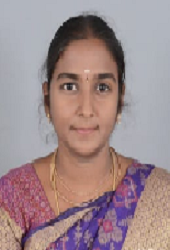
Dr.(Mrs.)U.Umadevi
M.Sc., M.Phil., Ph.D., NET., SET.
Assistant Professor
E-Mail umadevi-bot@sfrcollege.edu.in Area of Specialization Medicinal Botany VIDWAN Profile
Dr.(Mrs.)K.Geetha
M.Sc., M.Phil., B. Ed., Ph.D.
Assistant Professor
E-Mail geetha-bot@sfrcollege.edu.in Area of Specialization Microbiology VIDWAN Profile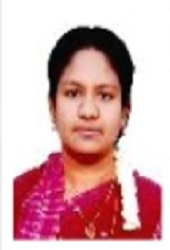
Dr.(Mrs.)K.MydeenFathimaBegam
M.Sc., M.Phil., Ph.D.
Assistant Professor
E-Mail mydeen-bot@sfrcollege.edu.in Area of Specialization Plant Anatomy and Histochemistry VIDWAN Profile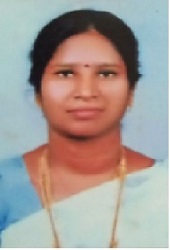
Dr.(Mrs.) J. Kasthuri
M.Sc., Ph.D
Associate Professor
E-Mail kasthuri-zoo@sfrcollege.edu.in Area of Specialization Microbial Biotechnology VIDWAN Profile
Dr. (Mrs.) A. P. Gowsalya Devi
M.Sc., M.Phil., SET., Ph.D.
Assistant Professor
E-Mail gowsalyadevi-bot@sfrcollege.edu.in Area of Specialization Environmental Biology VIDWAN Profile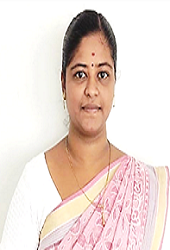
Dr. P. Uma Maheswari
M.Sc., M.Phil., Ph.D
Assistant Professor
E-Mail umamaheswari-bot@sfrcollege.edu.in Area of Specialization Phytomedicine, Nanotechnology and Tissue Culture VIDWAN Profile
Dr. (Mrs.) A.Asha,
M.Sc., M.Phil., Ph.D.
Assistant Professor
E-Mail asha-bot@sfrcollege.edu.in Area of Specialization Plant Physiology VIDWAN Profile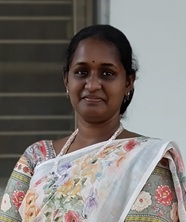
Ms. V. Anantha Jothi
M.Sc.
Visiting Faculty
E-Mail ananthajothi-bot@sfrcollege.edu.in Area of Specialization Marine Macro AlgaeRemarkable Activities

Workshop on “Application of Digital Tools in Biology” on 19.09.2025 at Audio Visual Lab.
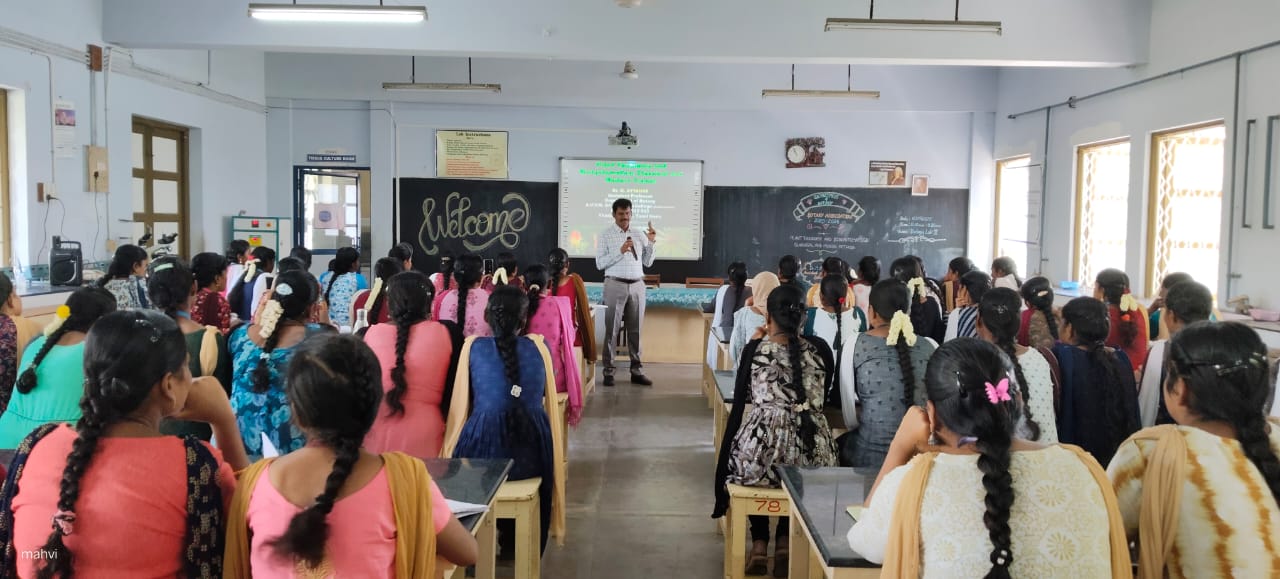
On 16.09.2025, Dr. M. Ayyanar from A.V.M.M. Sri Pushpam College gave a guest lecture on Plant Taxonomy and Biosystematics, explaining both classical and modern methods.
Guest Lecture on The Future of Plant Science (Under S.F.R. College Alumnae Association) on 19.08.2025 at Conference Hall.
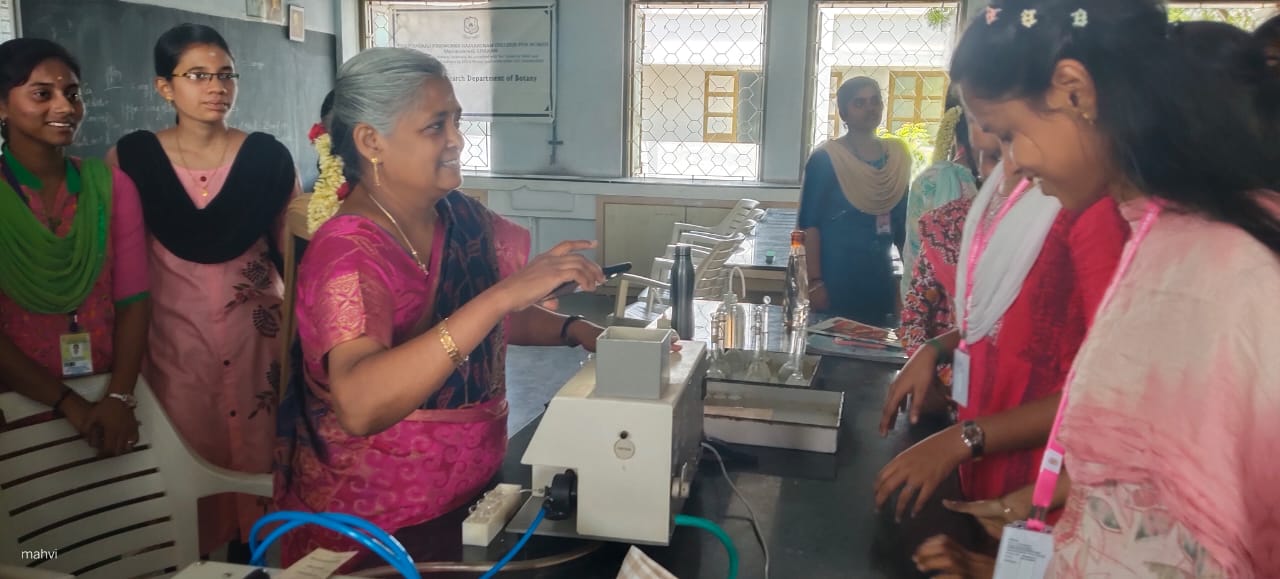
Interdepartmental Workshop on Flame Photometer on 12.08.2025 at Biology Lab II.
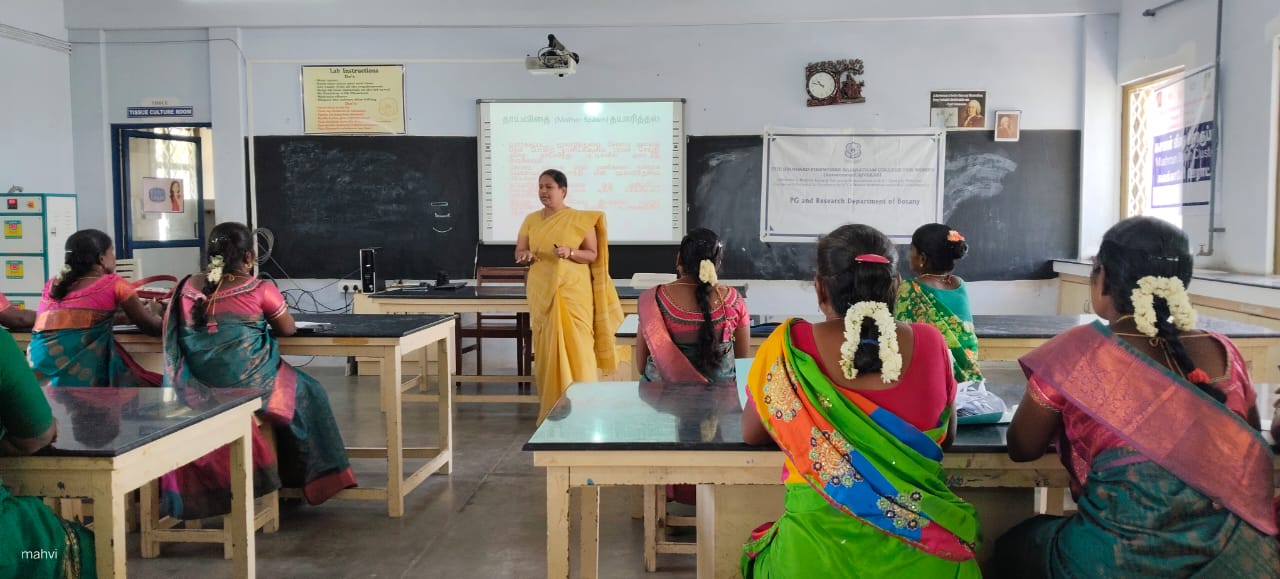
On 06.08.2025, Dr. K. Mydeen Fathima Begam, Assistant Professor of Botany at The Standard Fireworks Rajaratnam College for Women, Sivakasi, conducted a consultancy workshop on the preparation of mushroom spawn.
A Guest Lecture on Heal with Herbs on 16.07.2025 at Conference Hall.
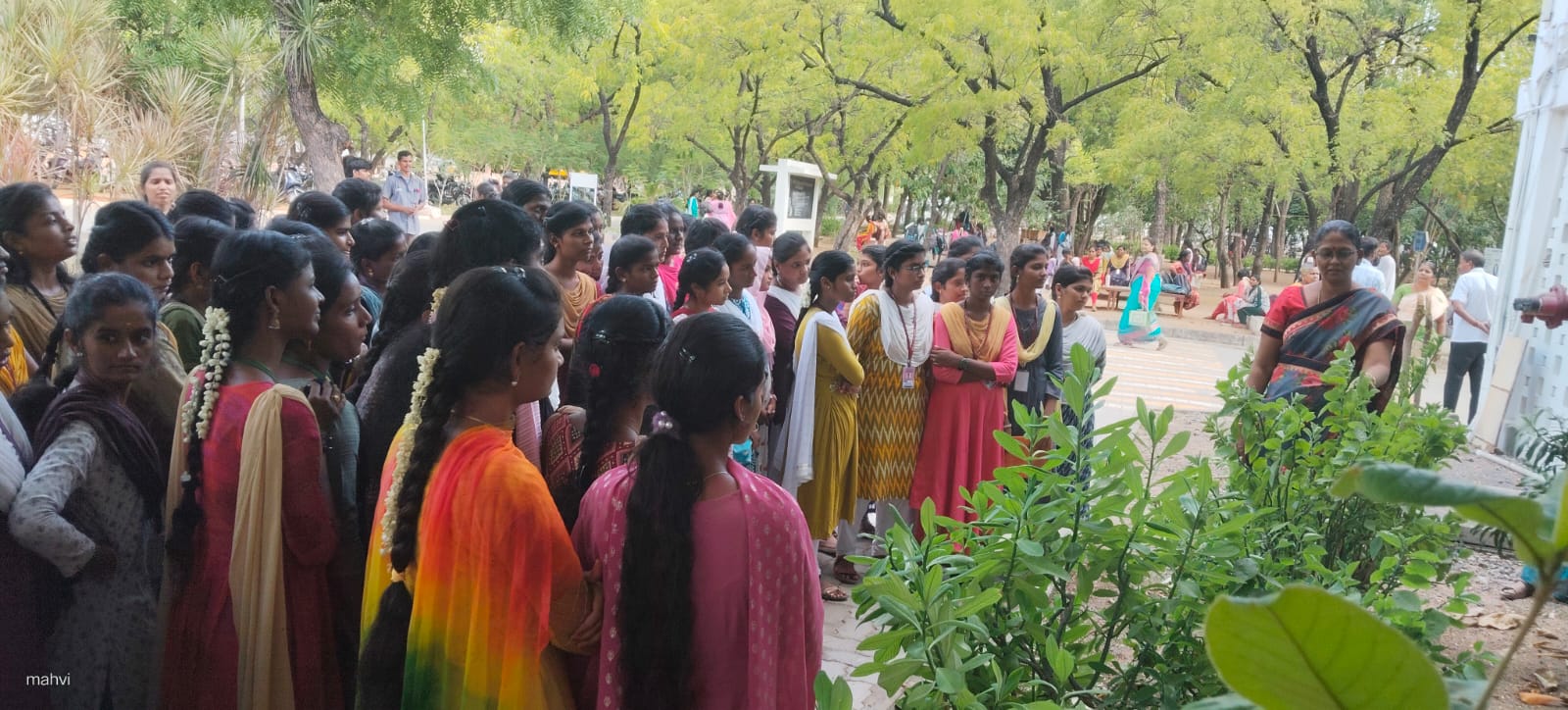
The Department of Botany Organized a field based educational activity titled “Exploration of SFRC’s Flora on 04.07.2025.

Orientation Programme on Green Horizons for Aspiring botanists on 16.06.2025 at Biology Lab II
05.02.2025 & 06.02.2025 - International Conference on “Global opportunities and challenges in holistic herbal medicine”
05.02.2025 & 06.02.2025 - International Conference on “Global opportunities and challenges in holistic herbal medicine”
30.08.2024 : Mrs. M.Vijayalakshmi, III B,Sc.Botany
Topic: “Herbal Products”
02.08.2024 : Dr. A. Asha, M.Sc., M. Phil., Ph.D., Assistant Professor of Botany, SFRC, Sivakasi. Topic: “Nanotechnology”
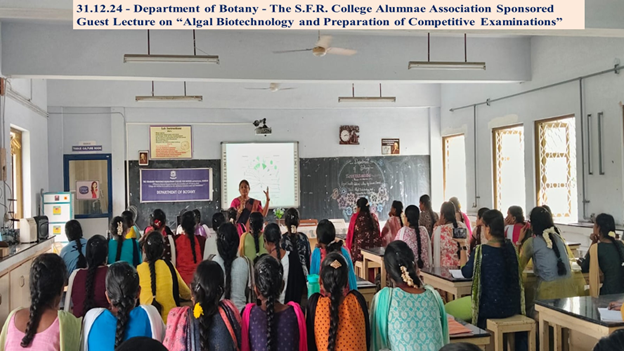
04.09.2024 : Thiru. G.Maran, Social activist & Secretary, Thaai Vazhi Iyarkkai Unavagam, Sivakasi.
Topic: Faculty Development Programme on “இயற்கை உணவும் மகளிர் நலமும்”
Field Visit to AVN, Madurai
24.01.2025
Biodiversity field study on Achenkovil –Manalar Kumbhavurutty region on 28.09.2024
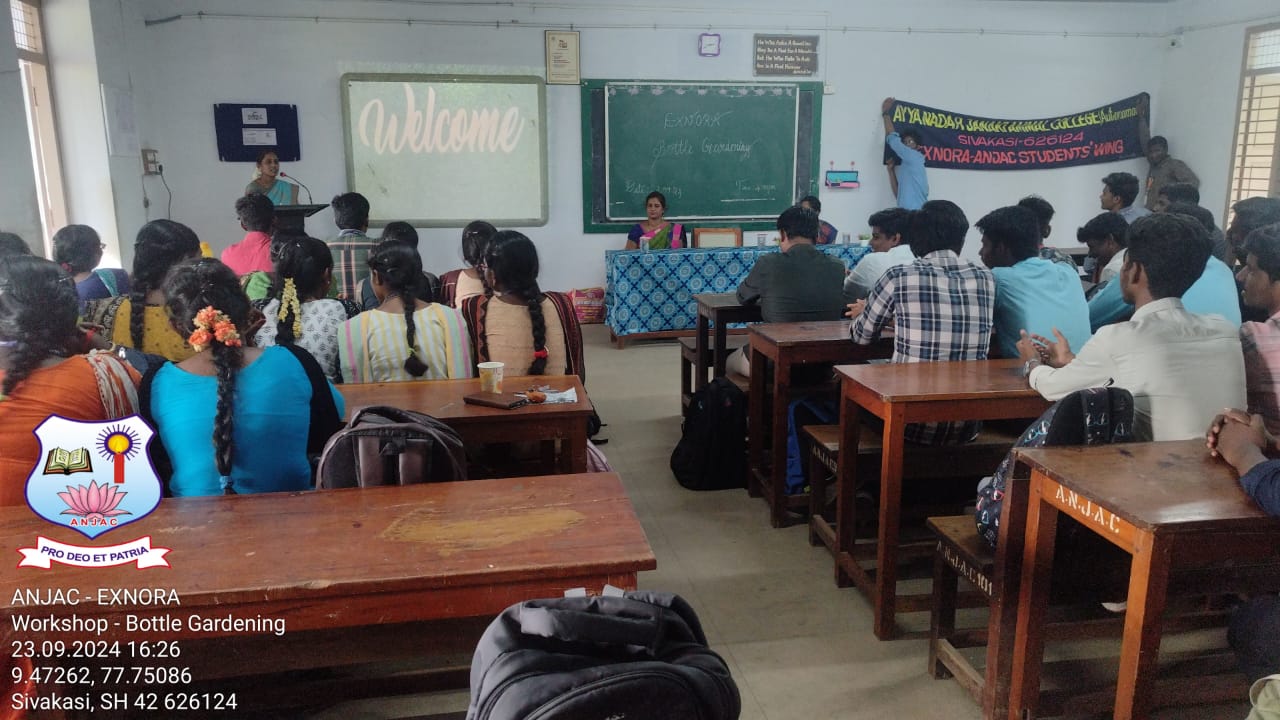
23.09.2024 : Dr.K.Geetha, Assistant Professor of Botany,SFRC,Sivakasi, Delivered Guest lecture on “Bottle gardening” on ANJAC EXNORA, ANJA College, Sivakasi
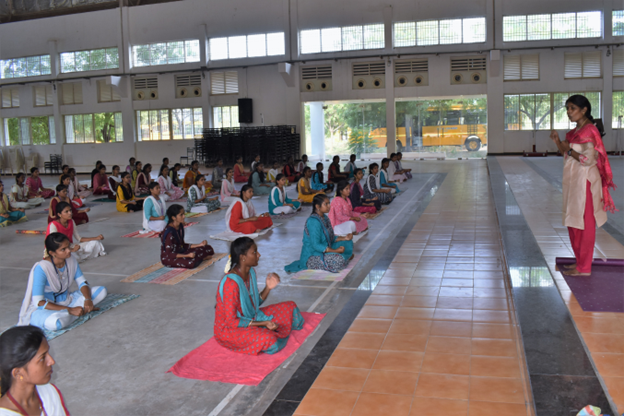
20.09.2024 : Mrs. M.Vasuki, B.Sc., M.A., Dip in Yoga therapy, (Alumna - B.Sc. Botany 1994 -1997), Yoga Therapist, LAYA yogamarkam, Sivakasi
Topic: Workshop on “யோகாவின் யோகங்கள்
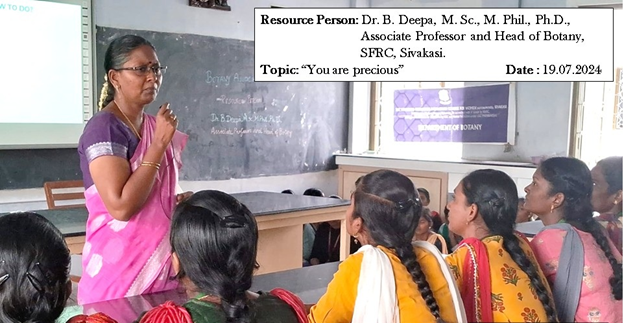
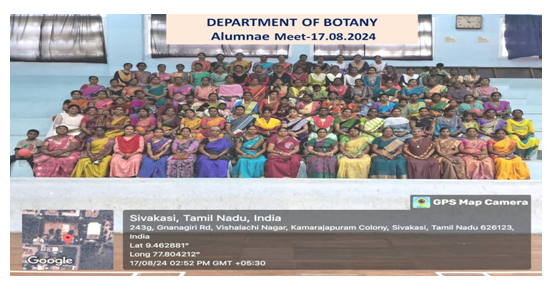
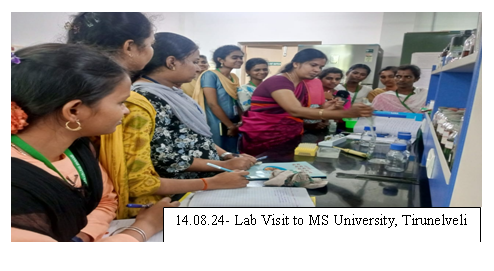
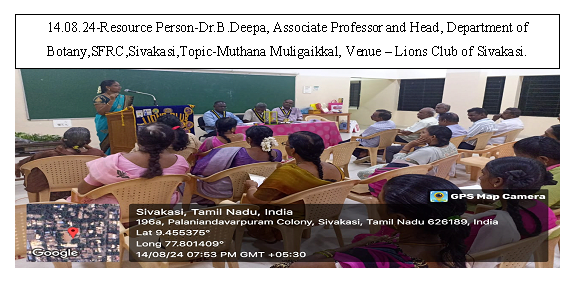
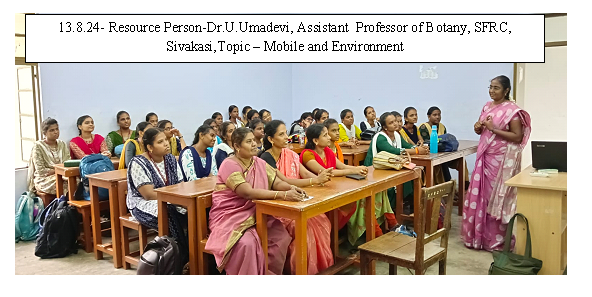
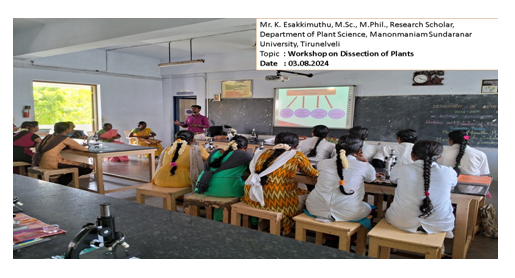
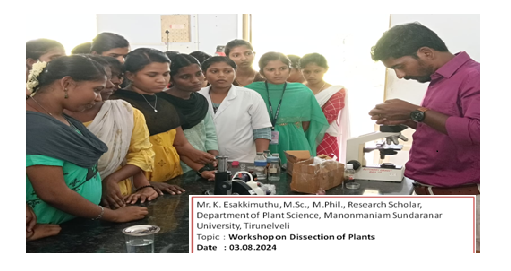
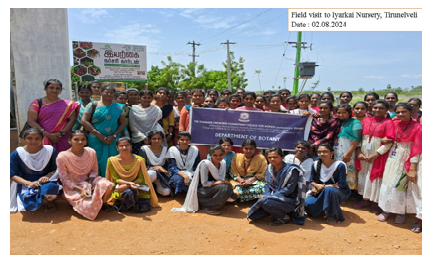
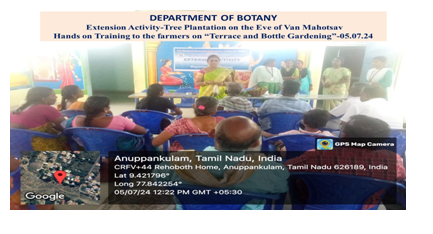
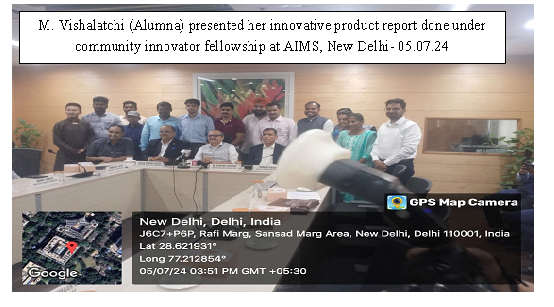
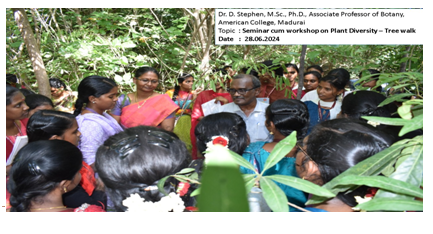
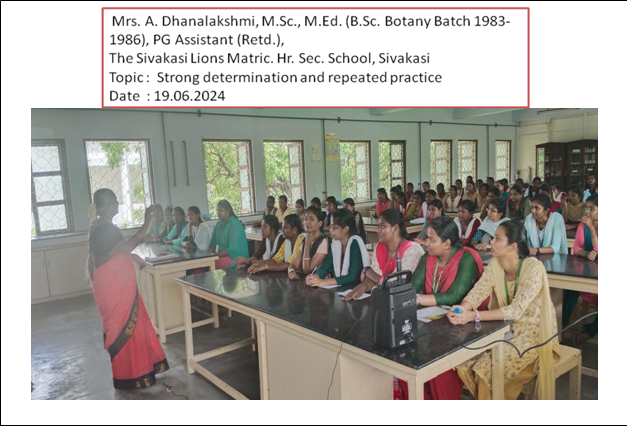
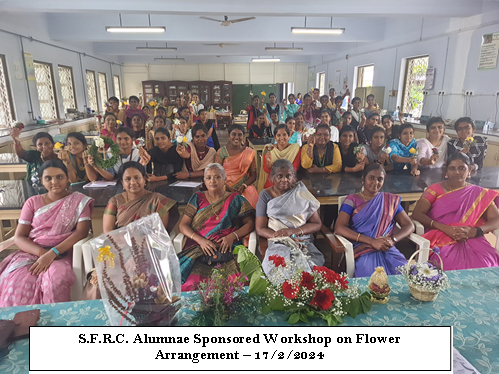
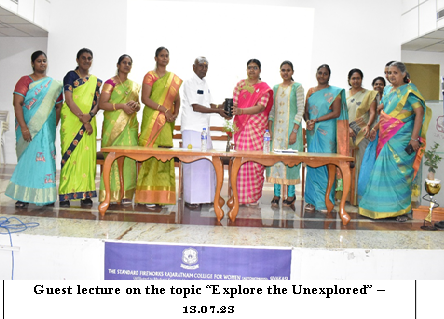
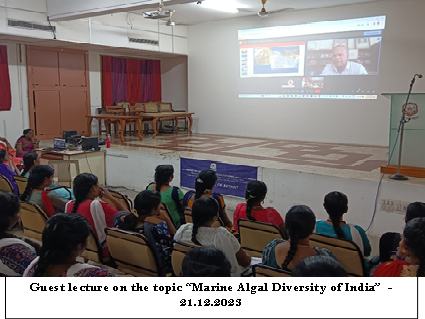
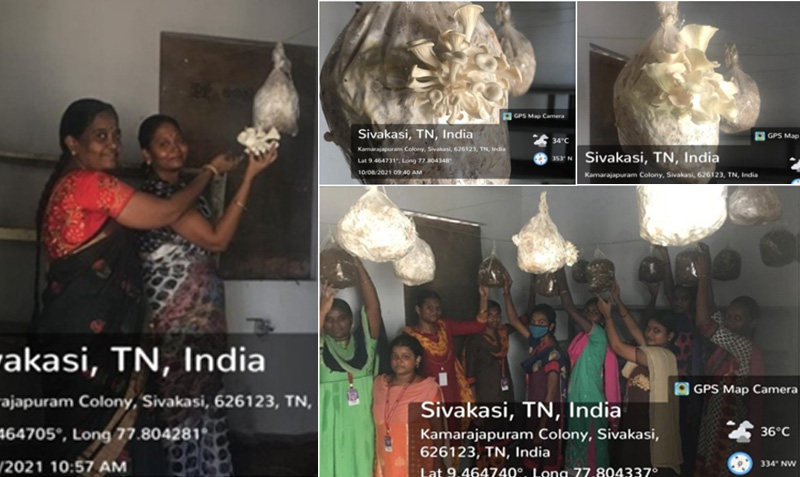
CULTIVATION OF MUSHROOM
| Activity | : | Guest Lecture |
| Programme | : | “Molecular Markers” |
| Resource person | : | Dr.N.Nirmal Kumar,Assistant Professor, Department of Botany, VHNSN College (Autonomous),Virdhunagar. |
| Venue | : | Multipurpose Hall |
| Date & Time | : | 19.03.2021 & 2.00 -3.00 pm |
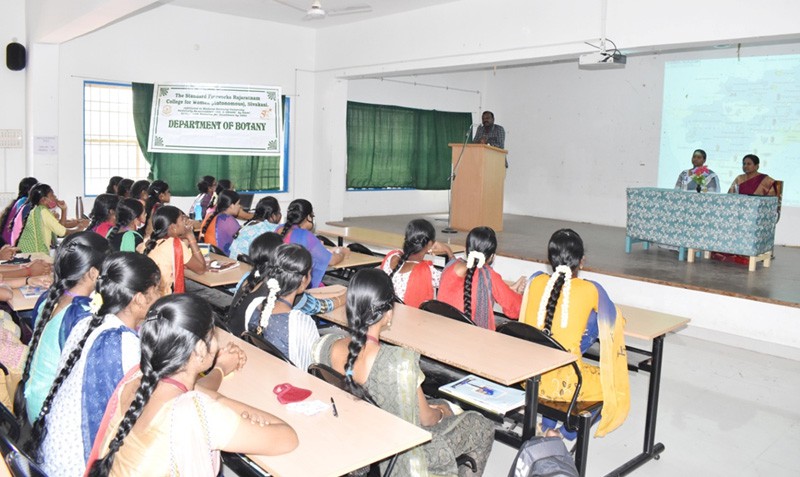
| Activity | : | Faculty Development Programme |
| Programme | : | “How do handle Emotions?” |
| Resource person | : | Dr.S.Ashokan,B.S.M.S,M.B.A.,D.Y.S.E., Natureshine Herbals Private Limited, Chennai |
| Venue | : | Online |
| Date & Time | : | 12.03.2021& 2.00-3.00 pm |
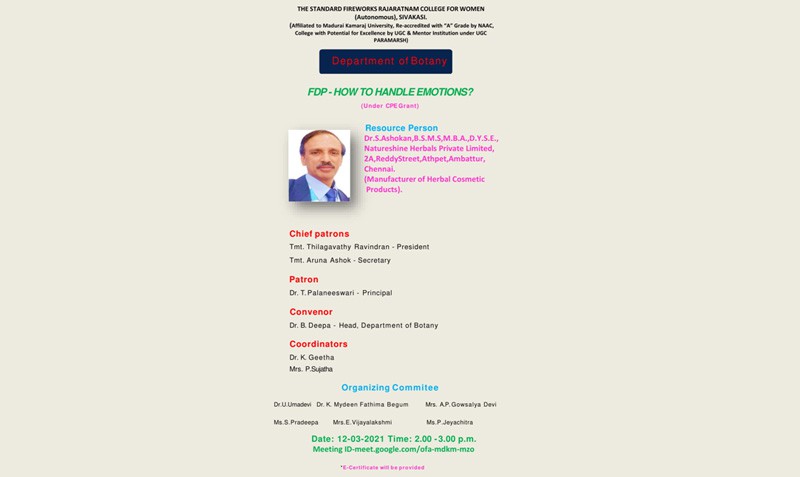
| Activity | : | Faculty Development Programme |
| Programme | : | “Recent researches on COVID19” |
| Resource person | : | Dr.ArchanaS.Rana, Assistant Professor of Microbiology, Christ College, Rajkot, Gujarat |
| Venue | : | Online |
| Date & Time | : | 21.7.2020 & 10.00 am to 11.00 pm |
| Participant | : | 66 faculty members |
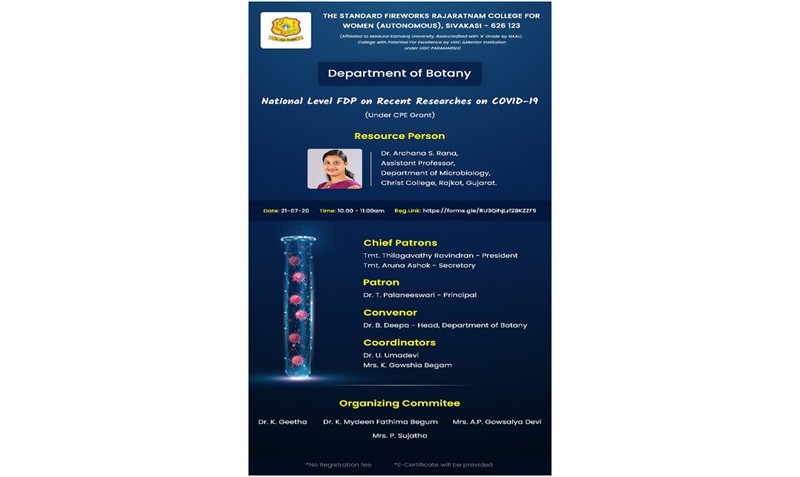
| Activity | : | Faculty Development Programme |
| Programme | : | "Integration of Teaching and Research" |
| Resource person | : | Dr. P. Ravichandran, Professor and Head, Department of Plant Science, ManonmaniamSundarnar University, Tirunelveli, |
| Venue | : | Online |
| Date & Time | : | 27.07.2020& 10.00 am to 11.30 pm |
| Participant | : | 120 faculty members. |
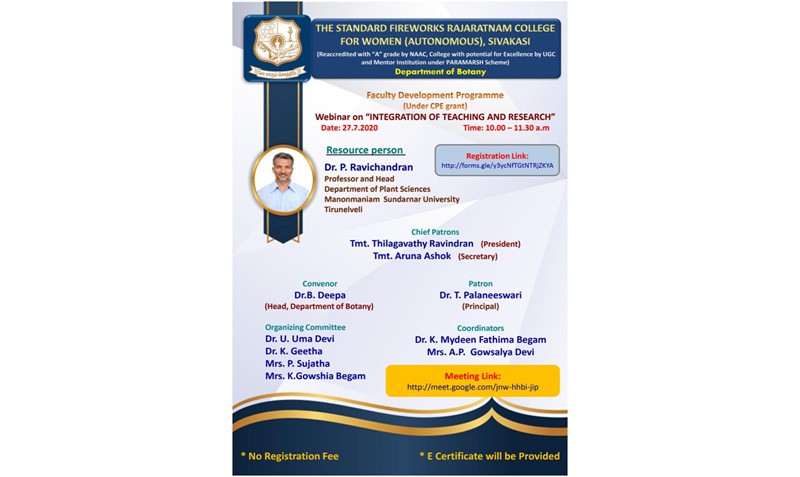
| Activity | : | Online Webinar |
| Programme | : | “Photo-Biotechnology” |
| Resource person | : | Dr. M. Ganesan, M.Sc., Ph.D. (JSPS Fellow), Plant Cell Engineering Laboratory coordinator, School of Biotechnology, Assistant Professor, Department of Life Science, Presidency University, Kolkata, West Bengal. |
| Venue | : | Online |
| Date & Time | : | 25.06.2020 & 10.30 am to 12.00 pm |
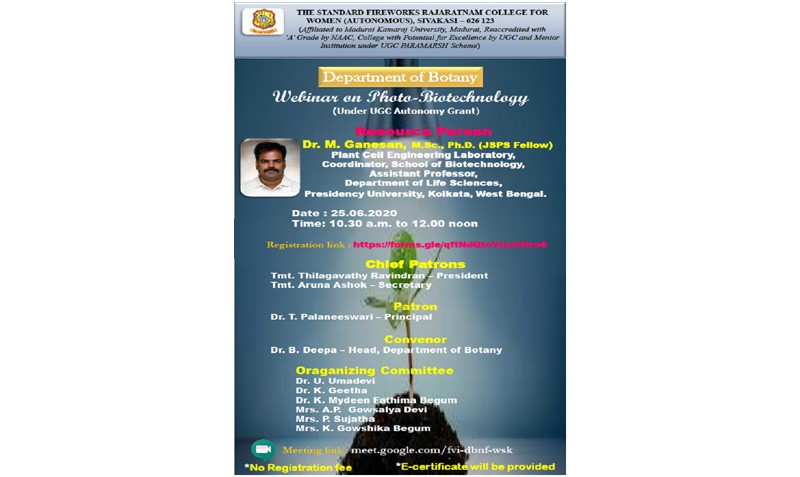
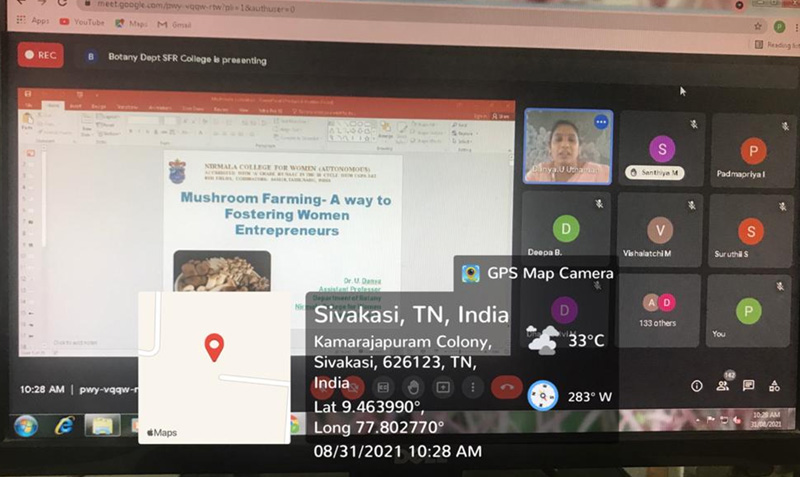
Date :31.08.2021
Activity :Guest Lecture
Topic :“Mushroom Farming – A Way to Fostering Women Entrepreneurs”
Resource person : Dr. (Mrs.) U. Danya,
Assistant Professor,Department of Botany,
Nirmala College for Women (Autonomous),
Coimbatore.
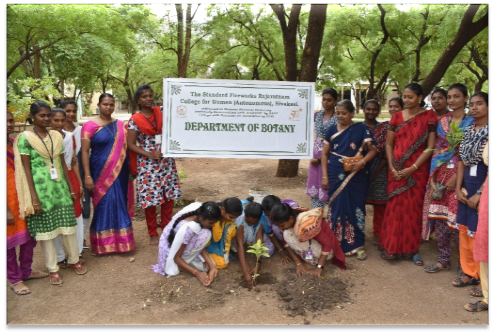
Tree Plantation Drive - One student One Tree Plantations on 26.8.19 initiated by MHRD, Government of India.
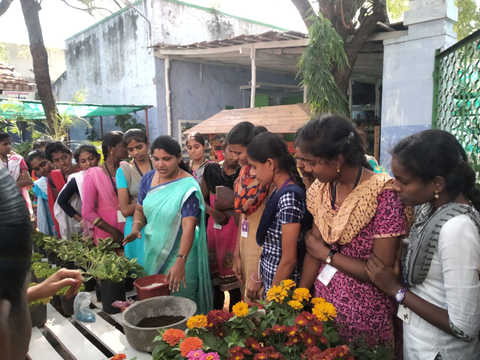
Date : 10.01.2020
Topic : Workshop on “Indoor gardening”
Venue : Vijaya nursery Centre, Sivakasi
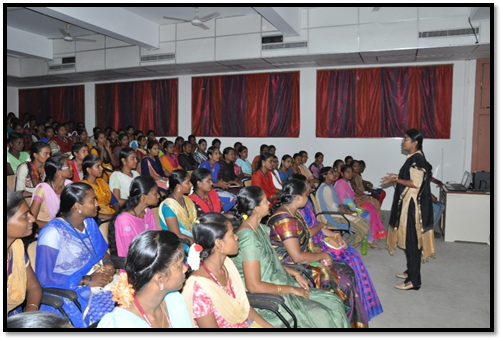
Date : 16.08.2019
Activity : Seminar
Topic : Higher Education and Research in Life Sciences: Challenges and Opportunities
Resource person : Dr. A. Rajeswari, Postdoctoral Fellow, Indian Institute of Science, Bangalore
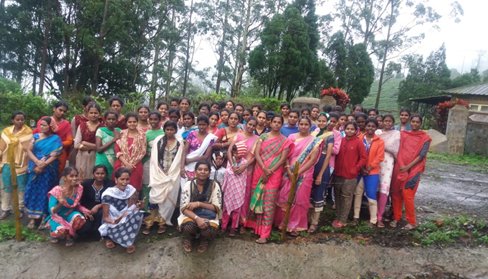
Date : 11.8.18
Field visit : Meghamalai (51 Botany Major Students)
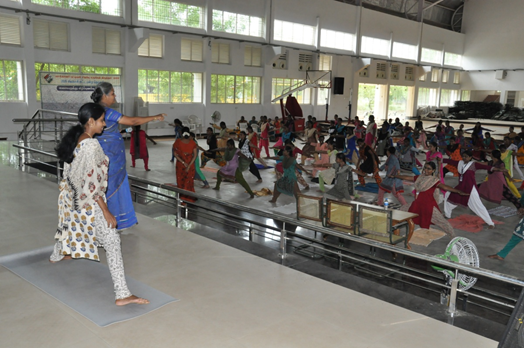
Date : 20.09.18
Topic : Workshop on “Yoga for Women”
Resource Person : Mrs. M. Vasuki, B.Sc., M.A., (Alumnae 1993- 96 Batch) Thiruthangal Road, Sivakasi.
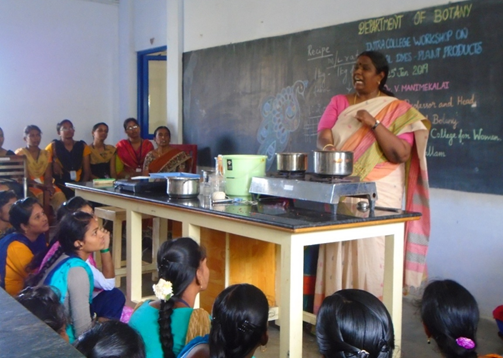
Date : 25.01.19
Topic : Intracollegiate Workshop on “Preparation of natural dyes from plant products”
Resource Person : Dr. V. Manimekalai, Associate Professor and Head, Department of Botany, Sri Parasakthi College for Women, Courtallam.
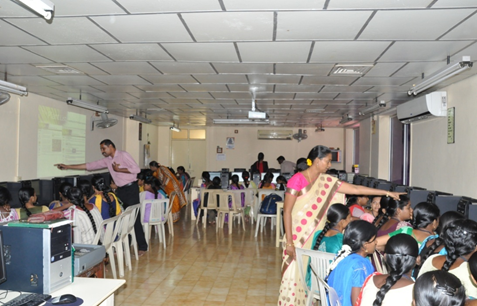
Date : 16.08.18
Topic : Workshop on “Plant Taxonomy - An Over view”
Resource Person : Dr. S. Karuppusamy, Assistant Professor of Botany, The Madura College, Madurai
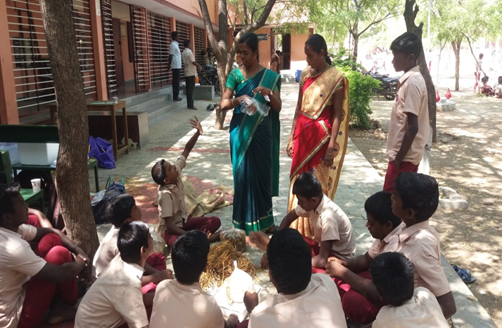
Extension activity on "Mushroom cultivation" venue: A.U.Govt.Hr.Sec.School, Sivakasi. Date:22.2.17
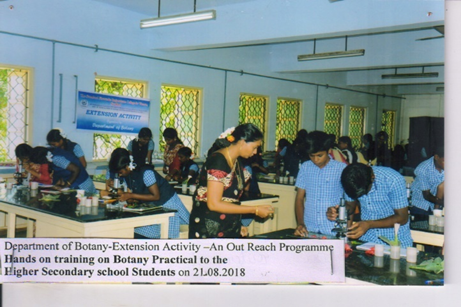
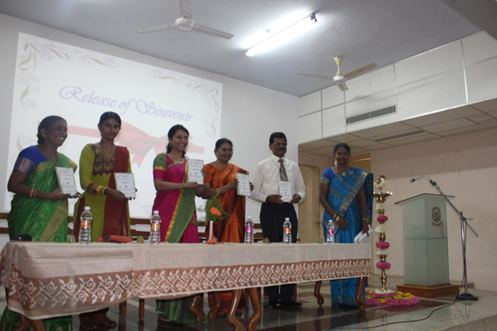
UGC sponsored National Seminar on Recent Advances in Plant Biology 13.07.18 and 14.07.18
Staff Achievements
07.03.2025 - Dr. U. Umadevi, Assistant Professor of Botany Received HCC Women Achiever Award at Holy Cross College, Tirchy
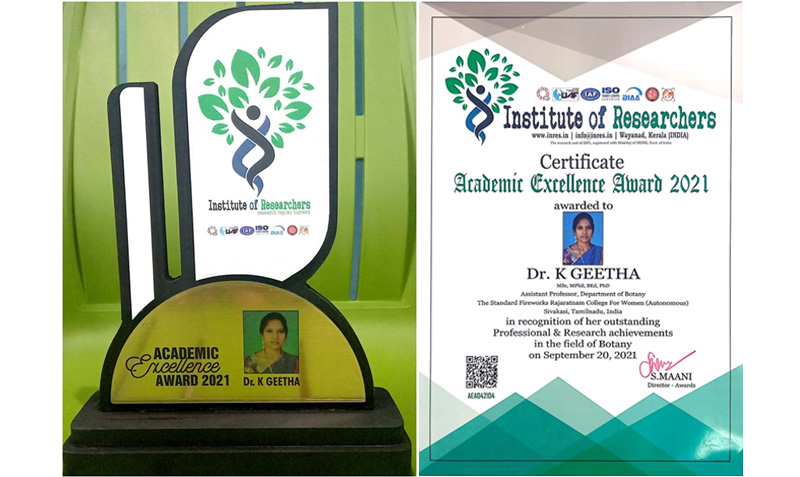
20.09.2021- Dr.K.Geetha-Received Academic Excellence Award 2021 from Institute of Researchers, Wayanad, Kerala,
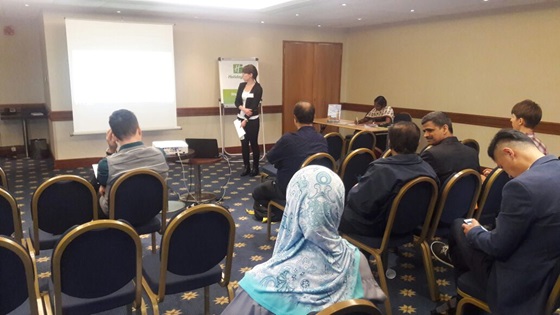
Dr.U.Umadevi, acted as chair person in the18 th International conference on Livestock farming, Medicine and Surgery on 2016.
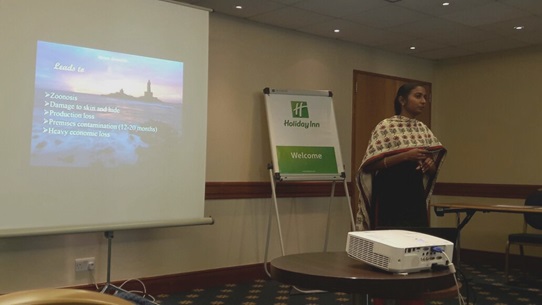
Dr.U.Umadevi, received Best paper award in the 18 th International conference on Livestock farming, Medicine and Surgery organized by International Scientific and Experimental Development on 2016.
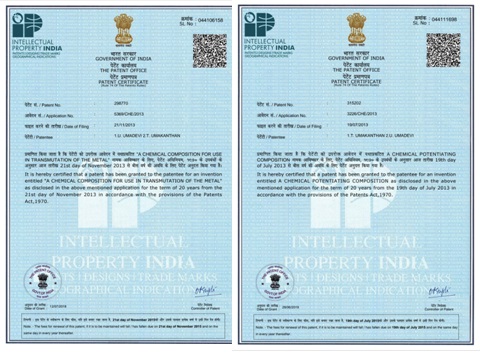
Patents received by Dr.U.Umadevi
Student Achievements
13.03.2025 & 14.03.2025 - N. Kamini,S. Murugeswari – III B.Sc. Botany & M. Saranya – II B.Sc. Botany I prize in Art of carving conducted by Department of Horticulture, School of Agriculture and Horticulture, Kalasalingam University, Krishnankoil
21.02.2025 - Inter Collegiate Competition organized by Department of Biotechnology & Botany, Sri Kaliswari College, Sivakasi
17.02.2025 - S. Muthulakshmi, I M.Sc. Botany- I Prize in Short Film organized by Department of Collegiate Education, Chennai
18.12.24 - S. Muthulakshmi, I M.Sc. Botany - I Prize in Short Film in Ayyan Thiruvaluvar Statue Silver Festival Competition organized by Collegiate Education Department, Sattur
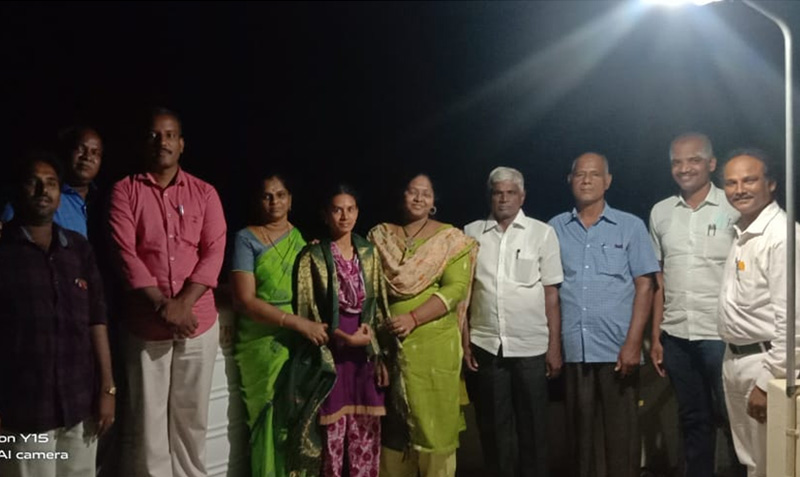
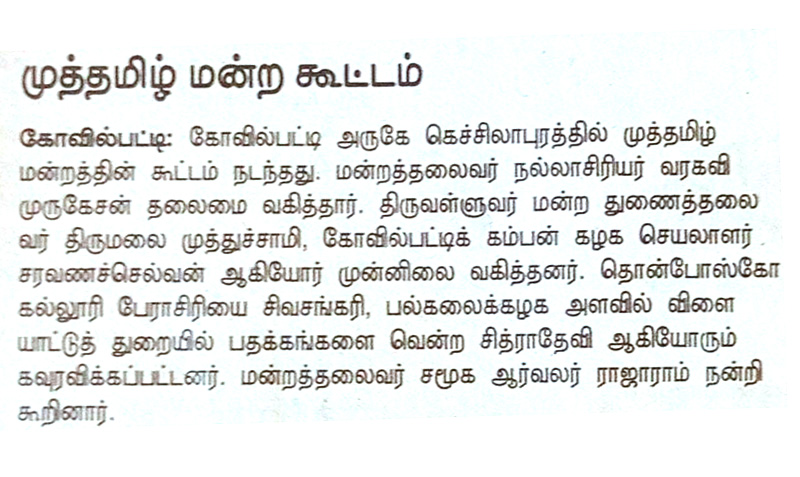
M.Chitradevi (University Blue) -Alumnae (M.Sc.Botany with specialization in Plant Biotechnology: Batch-2019-2021) -
Received honour from the MuthamilMandram, Kovilpatti.
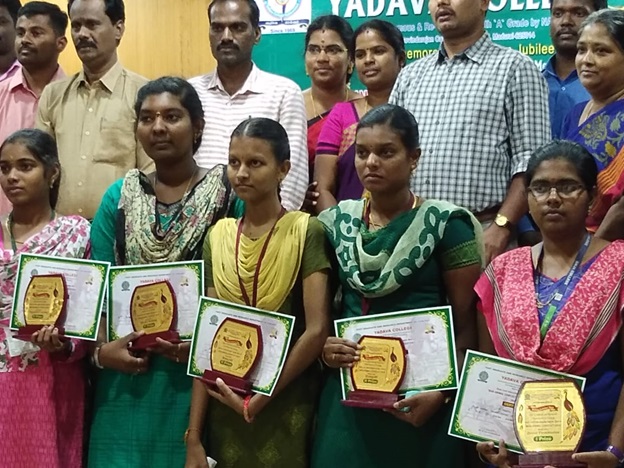
State level Intercollegiate competition students meet on ‘Man – Animal conflict and Co-existence – 2019 (MAC – 2019) organized by post graduate and research department of Zoology, Yadava college, Madurai.
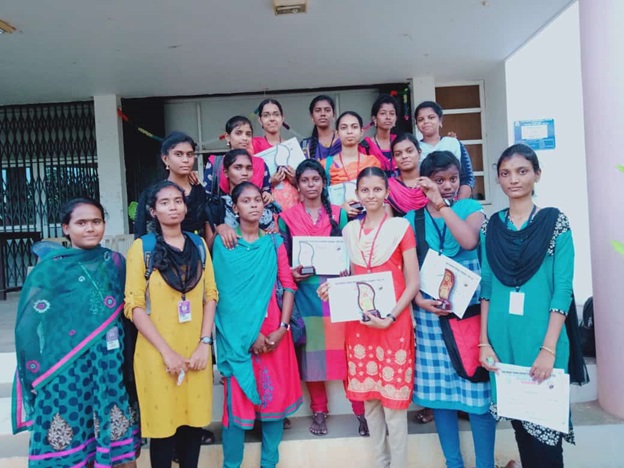
13.09.2019 -State level Intercollegiate meet Biobeatz’19
Organised by the Department of Biotechnology, Ayya Nadar Janaki Ammal College, Sivaksi.
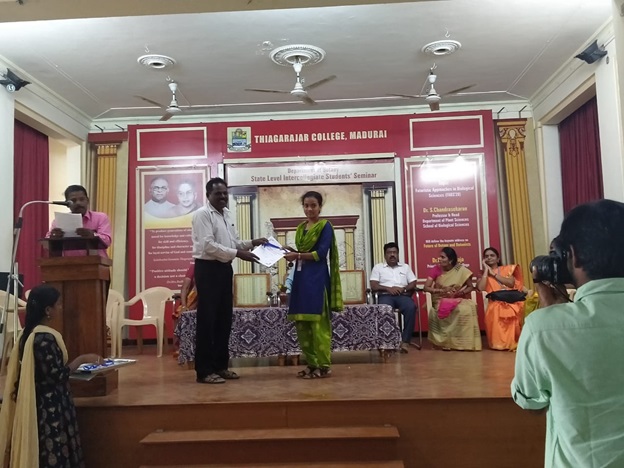
J.Tamilarasi, I B.Sc. Botany with Specialization in Plant Biotechnology- third prize in the State level intercollegiate students seminar organized by Department of Botany, Thiagarajar College, Madurai.
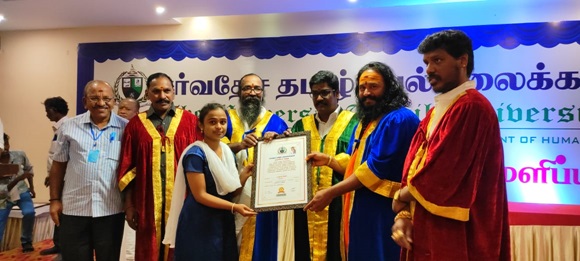
P.Durga devi, received Kalaisudar award from Sarvadesa Tamil palkalai kazhagam.
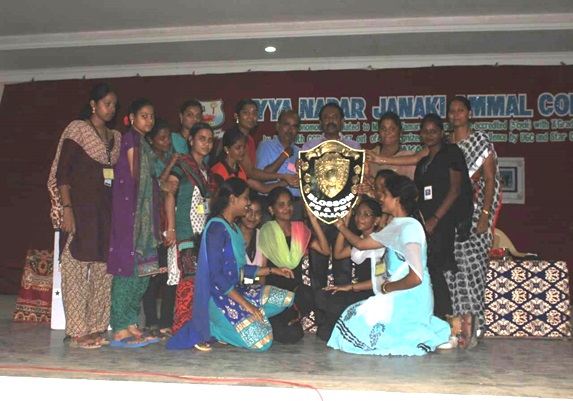
2.03.2017 - Overall shield in the Intercollegiate Technical meet – Blossom’17 organized by the Department of Plant Biology and Plant Biotechnology, Ayya Nadar Janaki Ammal College, Sivakasi.
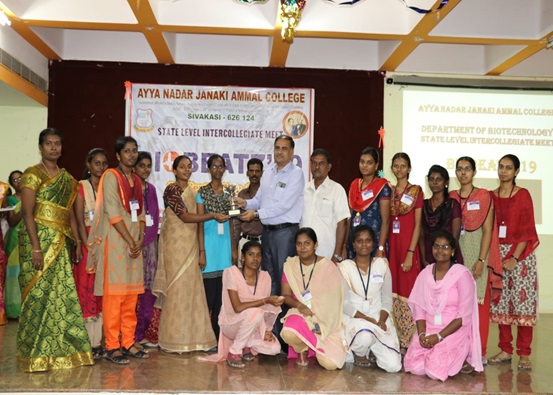
13.09.2019 - Overall shield in the State level Intercollegiate meet organized by the Department of Biotechnology, Ayya Nadar Janaki Ammal College, Sivakasi.
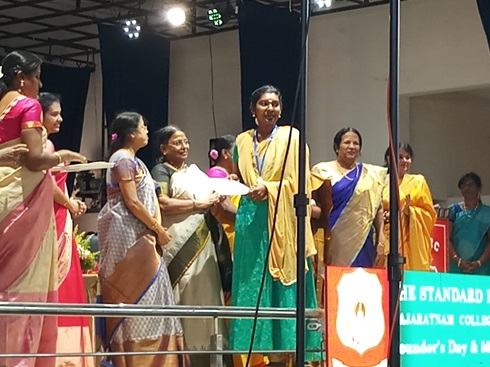
G.Yamini Rathna III B.Sc. Botany with Specialization in Plant Biotechnology awarded Best Outgoing student for the year 2018-2019.
Contact Us
Thiruthangal Road , Sivakasi - 626123 , Tamil Nadu , India
Telephone Number
+91 4562-220389 FAX Number
+91 4562-226695 Email ID
sfrc@sfrcollege.edu.in
